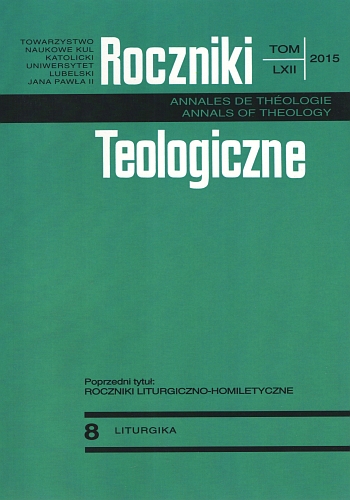Teologia communio według kard. Josepha Ratzingera (Benedykta XVI) i pytanie o urzędy/posługi w polskim duszpasterstwie parafialnym
The Communio Theology according to Card. Joseph Ratzinger (Benedict XVI) and the Question of Offices/Ministries in Polish Churches
Author(s): Krzysztof PorosłoSubject(s): Christian Theology and Religion
Published by: Towarzystwo Naukowe KUL & Katolicki Uniwersytet Lubelski Jana Pawła II
Keywords: Joseph Ratzinger;Benedict XVI;communio;communio-ecclesiology;Church;offices;ministres;active participation (participatio actuosa);common priesthood;
Summary/Abstract: Developing the so-called communio-ecclesiology (Communio-Ekklesiologie), Cardinal Joseph Ratzinger pointed out that “the Church should not speak mainly about itself, but about God.” Bearing in mind this methodological assumption, the author of this article is going to analyse numerous writings by Card. Joseph Ratzinger—at present Pope Emeritus Benedict XVI, in order to present the essence of his teaching about the Church as communio and to see what such image of the Church means to the priests’ praxis, especially in terms of the laity’s ministry and participation in the liturgy in the Polish pastoral reality. The first part of the article presents Ratzinger’s fundamental teachings about the Church understood as communio. In the second part, one can find out about the tasks/ministries through which lay people may participate in Christ’s only priesthood. Ratzinger’s criticism on perceiving the laity’s active participation (participatio actuosa) in the liturgy as having only a practical dimension is presented in the third part of the article. The last part includes conclusions for shaping and understanding ministries in particular churches, supported by the words written by Ratzinger himself: “Proper education for liturgy should not consist in learning and practising external acts, but in joining the essence of action, i.e. the transforming power of God, which is constitutive for the liturgy and, through liturgical action, wants to transform us and the surrounding world.” Where practical issues become more important than theology, the Church viewed as the community of salvation becomes, at the most, an institution offering a rich variety of religious services.
Journal: Roczniki Teologiczne
- Issue Year: 62/2015
- Issue No: 08
- Page Range: 131-143
- Page Count: 13
- Language: Polish

